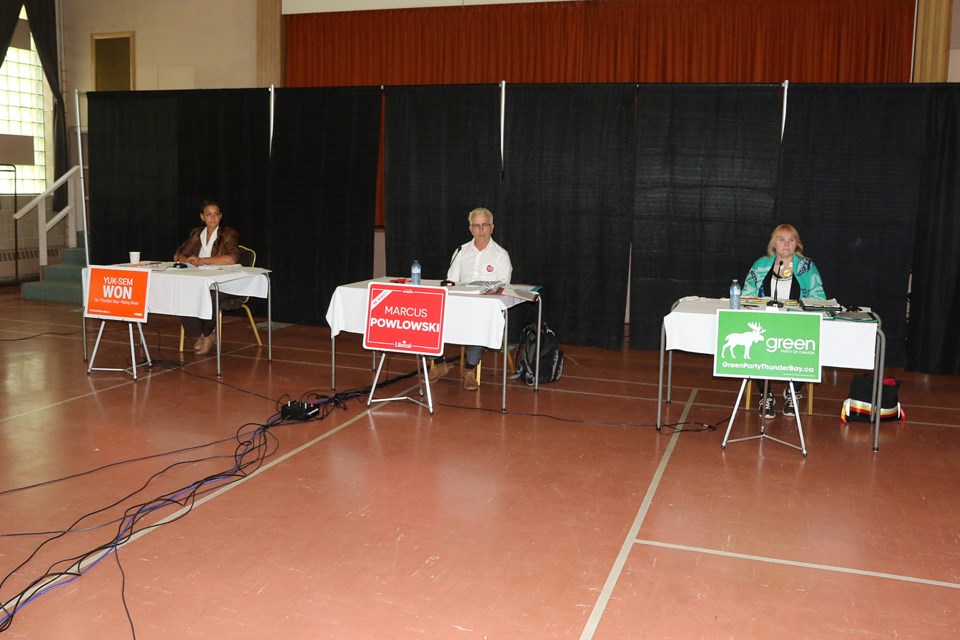THUNDER BAY – Reconciliation, COVID-19 recovery and connectivity were the themes debated on Thursday at a Thunder Bay Chamber of Commerce-hosted forum featuring the federal election candidates in Thunder Bay–Superior North.
Liberal incumbent Marcus Powlowski, the NDP’s Yuk-Sem Won and Green Party hopeful Tracey MacKinnon took part in the hour-long discussion, which started airing on both the Chamber website and NetNewsLedger, on Friday evening.
Conservative candidate Adelina Pecchia declined to take part and PPC candidate Alan Aubut was excluded, organizers following rules of inclusion set out by the Leaders’ Debate Commission that required a member of Parliament elected under the party banner, or either four per cent support in the previous federal election or, within five days of the election call, four per cent support in leading national polls.
Pecchia has also declined to take part in next week’s scheduled Thunder Bay Television debates.
The PPC did not meet any of the stated requirements.
The NDP’s Won said one thing Canadians have learned this past summer, in the wake of the discovery of thousands of unmarked graves tied to former residential schools, is that the country hasn’t done nearly enough on the reconciliation front.
“Successive governments have denied basic human rights, schooling children, forcing people off their lands and claiming land without compensation and consent. They’ve spent millions of dollars fighting in courts on the underfunding of Indigenous children and communities, trying to overturn human rights rulings and litigating against residential school survivors.”
Powlowski acknowledged federal governments of the past had left a terrible legacy behind, adding the government has completed about 80 per cent of the recommendations arising from the Truth and Reconciliation Commission.
“And the government has committed to looking and helping to try to find the bodies anywhere in the country we’re needed to,” Powlowski said.
MacKinnon, who considers herself an Indigenous ally, said her heart was broken when the stories began to emerge of bodies being found in Kamloops, B.C. and elsewhere in Canada.
“That’s a dark truth of Canadians’ history that we’re being made aware of,” she said.
Pandemic recovery was another hot topic discussed during the first half-hour of the debate, the questions coming from the Anishnabek Business Professional Association and the Chamber, co-hosts of the event.
MacKinnon, a poverty advocate, said the pandemic showed there are huge gaps in the system, which need to be addressed. Facing a phone disconnection herself, MacKinnon said it’s time to consider a national guaranteed basic income-style program to help lift people out of economic distress.
“These are things that impact community members who maybe didn’t have a voice. I’m here to give people a voice, people like me living on a low income,” she said.
MacKinnon added her party wants to decriminalize drugs, which could in turn help alleviate a growing overdose problem in Thunder Bay and in the region.
Won took it one step further.
“We need to declare a public-health emergency immediately. We need to end the criminalization and stigma of addiction and provide increased support to those individuals so they can have hope and the ones who love can have hope,” she said. “We need to address overdose prevention, have treatment on the and ... and go back to land-based treatment services.”
Powlowski, a medical doctor, said he’s seen all too often the effects of addiction. There are no easy solutions, he added.
“It is difficult and I think anyone who has known anyone or has a child who has been involved in drug addiction realizes the difficulty of getting people off drugs. Our government has made the commitment. We spent over $600 million over the past six years addressing the opioid crisis,” Powlowski said.



